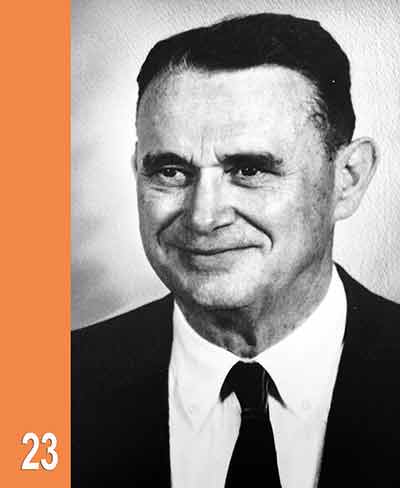Ralph McGill
Induction Year:¬Ý1979
Lived:¬Ý1898-1969
Papers: Nashville Banner; Atlanta Constitution
Ralph McGill made his name and fame as the editor and publisher of the Atlanta Constitution and championed civil rights in the South at a time when others considered it traitorous if not downright unhealthy.
He won hundreds of prizes, acquired international fame, became friends with the famous and was the subject of hundreds of newspaper and magazine articles and several books. But he always was quick to remind his admirers that most of what he wrote in Atlanta he had learned in Tennessee, first on his college paper and then on the Nashville Banner.
McGill was born in Soddy and frequently referred to himself as "an old Soddy-Daisy boy." He went to Vanderbilt University, played football, tried his hand at writing poetry and joined the college newspaper staff.¬Ý In his senior year he took a part-time job at the Banner. He planned to fill in for one day, but the temporary work soon became permanent. At first he took baseball play-by-plays over the telephone and then worked his way into a reporting slot, covering police.
He left the Banner in 1929 to become assistant sports editor of the Atlanta Constitution. And over the next 40 years he wrote a daily column, became editor and then publisher of the Constitution and gained international renown. Politics of his state and the nation was one of his favorite subjects. Long before it was popular with other editors, he wrote often in his clear and carefully reasoned style of the effects of southern politics that fostered racial strife, discrimination, injustice and poverty. And after the 1954 Supreme Court decision which outlawed segregation, he continued to lead his fellow southern editors (and many northern editors as well) in a stand for civil and human rights.
He became perhaps the most famous liberal voice in a still ultra-conservative South and among the many honors he received for his civil rights stand was a Pulitzer Prize for "editorial leadership" in 1959. One key to McGill's selection, the Pulitzer judges wrote, was a column of his on a church bombing in Atlanta and the school bombing in Clinton, Tenn., called "A Church, A School. . . ."
In the last two decades of his life, McGill's influence as a writer could be seen in the slow but sweeping changes that were coming over the South. McGill did not take credit for all of this, of course. But he was a leader--a firm and persuasive one-in helping the South and the nation to move closer to achieving the goals of a democratic society. His voice was not limited to the South alone. His column was syndicated nationally for more than 20 years and he was a regular contributor to major magazines.
He won practically every major award presented to journalists and writers in the nation including the Presidential Medal of Freedom in 1964. Throughout it all, he remained just "an old Soddy-Daisy boy" doing what any self-respecting editor should be doing--championing the cause of those who could not help themselves.
